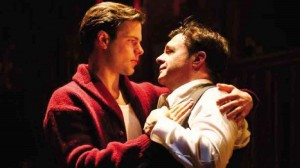The lead protagonist of Douglas Carter Beane’s Broadway play, “The Nance,” thrives in a world of duality. Nathan Lane’s character conveys infectious mirth onstage, but his rancid self-loathing is so palpable that we leave the Lyceum Theatre on 45th st. shaken by his penchant for self-destruction.
John Lee Beatty’s revolving set allows director Jack O’Brien’s end-of-an-era production to play out its two-pronged tale: Set in 1937 during Mayor Fiorello La Guardia’s campaign to eradicate burlesque shows on the New York City stages, it tells the story of Chauncey Miles (Lane), who works as a nance—a staple homosexual vaudeville character, conventionally portrayed by a straight actor, who’s tasked to entertain the audience in between striptease sketches.
In reality, the veteran stage comic is far from straight—and the irony isn’t lost on the feisty Mr. Miles: “It’s like a Negro doing black face,” he quips. The contradictions don’t end there—he is also a staunch Republican who utters lines like, “’Say something nice about Roosevelt (a Democrat) and prepare to have your eyes scratched out,” when he isn’t cruising for hot guys at automats after work.
With La Guardia’s frequent raids putting Chauncey’s career at risk, his world becomes even more complicated when he meets gorgeous but homeless out-of-towner Ned (Jonny Orsini), especially after the young guy ends up in his bed—and, thereafter, falls in love with him!
Cheap thrills
But, is Chauncey ready to give up cheap thrills for the love of one man? Needless to say, monogamy is a strange, new addition to the aging comic’s romantic vocabulary—and something he isn’t emotionally equipped to deal with.
Lane finds the perfect role to display his range and versatility because, while Chauncey’s winsome stage persona is the type that gets theatergoers’ high-fives and hearty guffaws, his offstage person is cynical and unapologetically flawed.
The challenge to stay true to his character is greater because, in a play (where music is incidental, and actors can’t just burst into song or hide behind production numbers), it’s easier to see through performers who wing it by playing to the peanut gallery. The thespic balancing act is decidedly complex for any actor worth his salt—and Lane comes out of it with flying colors!
But, the seasoned actor’s Tony-nominated portrayal wouldn’t have been as memorable and moving without Orsini’s fusion of “beauty” and vulnerability.
In a world as repressed as the hypocritical ’30s, the young actor’s earnestness provides a psychic balm for a marginalized sector in dire need of hope and reassurance. Talk about “too good to be true”—Ned is the Real Deal! Unfortunately, Chauncey is too caught up with his issues to see beyond his young lover’s ability to satisfy his voracious appetite for sex!
Lane and Orsini aptly juggle humor and pathos as they paint a painful but searingly realistic portrait of a flawed gay man—and his ceaseless search for affirmation and redemption!
